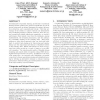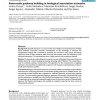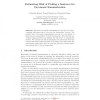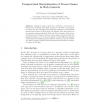2022 search results - page 105 / 405 » Natural-Language Semantics for Associations |
KDD
2005
ACM
14 years 9 months ago
2005
ACM
Discriminative sequential learning models like Conditional Random Fields (CRFs) have achieved significant success in several areas such as natural language processing, information...
WWW
2008
ACM
14 years 9 months ago
2008
ACM
The boom of product review websites, blogs and forums on the web has attracted many research efforts on opinion mining. Recently, there was a growing interest in the finergrained ...
BMCBI
2006
13 years 9 months ago
2006
Background: Scientific literature is a source of the most reliable and comprehensive knowledge about molecular interaction networks. Formalization of this knowledge is necessary f...
CICLING
2009
Springer
14 years 9 months ago
2009
Springer
Abstract. Automatic Document summarization is proving to be an increasingly important task to overcome the information overload. The primary task of document summarization process ...
CICLING
2007
Springer
14 years 3 months ago
2007
Springer
Ambiguous person names are a problem in many forms of written text, including that which is found on the Web. In this paper we explore the use of unsupervised clustering techniques...




